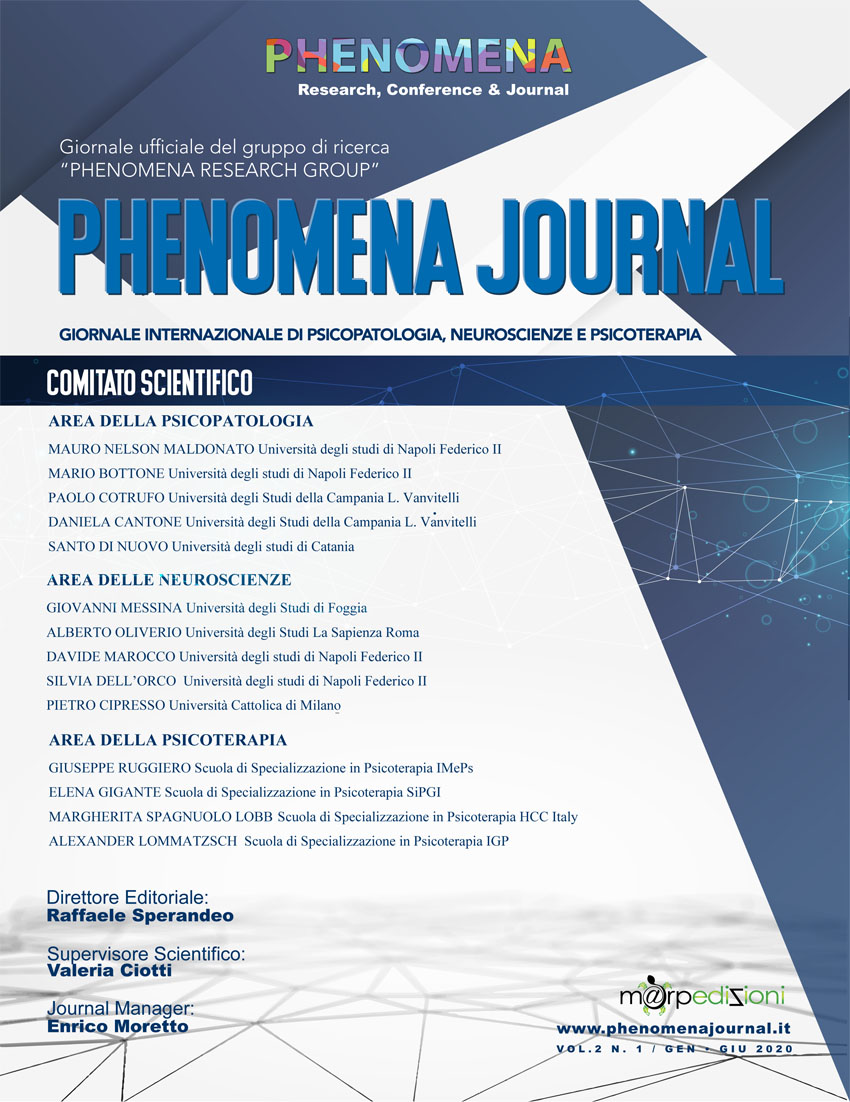Improving treatment adherence in behavioral addictions through an integrated process between motivation to change and self-empowerment
Published 2020-05-30
How to Cite
Abstract
To improve the client's adherence to the treatment of behavioral addictions (e.g. compulsive mechanisms such as food in DCA and play in GAP) and therefore therapeutic efficacy, targeted motivational work is needed, using the self-empowerment methodology . Eating disorders and gambling are characterized, on a psychopathological level, by compulsive behavior and affective-relational ambivalence, induced by intrapsychic conflicts, which lead the person to experience an internal torment between two opposite alternatives. In this ambivalent situation they feel in an obsessive cage focused on a fixed thought of eating or playing and often they cannot get out on their own or, if they decide they want to be helped and supported, they struggle to start treatment because they are afraid of change or they have no intrinsic motivation. The hypothesis of the study conceives motivational work as a useful and functional approach to addictions, not to change the patient or teach how to change but to allow him, through self-empowerment, to accept his condition, look at the inconsistencies of the behavior with awareness, and undertake a functional treatment for well-being. The theoretical framework is the transteoretic change theory of Prochaska, Norcross and Di Clemente, for which the motivational process of change takes place in six phases to be followed several times before being able to succeed. The goal of the work will be to increase patient compliance.
Keywords: behavioral addiction, self-empowerment, motivational work.
References
- Calamai, G. (2018). Dipendenze patologiche. IPSICO, Istituto di psicologia e psicoterapia comportamentale e cognitiva, Firenze
- Safer, D. L., Telch, C. F., Chen, E. Y., & Barone, L. (2011). Binge eating e bulimia: trattamento dialettico-comportamentale. Raffaello Cortina.
- Caretti, V., & La Barbera, D. (2005). Le dipendenze patologiche. Clinica e psicopatologia. Raffaello Cortina Editore.
- Cantelmi, T. et al. (2004). “Le dipendenze comportamentali”, Psicobiettivo XXIV, n. 2, 13-28
- Dimauro, P. E., Patussi V. (1999). Dipendenze. Manuale teorico pratico per operatori, Carocci editore, Roma
- Rosemberg, et al. (2015). Dipendenze comportamentali. Criteri, evidenze e trattamento. Casa Editrice. EDRA
- Atkinson, J. (1973). La Motivazione. Edizioni il Mulino, Roma
- Prochaska, J. O., & DiClemente, C. C. (1982). Transtheoretical therapy: toward a more integrative model of change. Psychotherapy: theory, research & practice, 19(3), 276.
- Bandura, A. (2000). Autoefficacia: teoria e applicazioni; tr, it Erikson. Trento.
- Janis, I. L., & Mann, L. (1977). Decision making: A psychological analysis of conflict, choice, and commitment. Free press.
- Giusti, E., & Francescato, D. (1999). Empowerment e clinica. Integrazione di tecni-che per I'autopotenziamento. Roma: Edizioni Kappa.
- Bruscaglioni, M. (2007). Persona empowerment. Poter aprire nuove possibilità nel lavoro e nella vita (Vol. 15). FrancoAngeli.
- Marazziti, D., Presta, S., Picchetti, M., & Dell’Osso, L. (2015). Dipendenze senza sostanza: aspetti clinici e terapeutici. Journal of Psychopathology, 21, 72-84.
- Chiacchio, A. (2013). Tra Crescita Personale ed Evoluzione Professionale. Esperienze, vissuti e Riflessioni di uno psicoterapeuta lucano in memoria del papà Vincenzo., Ed. Scientifiche ISM, cap. 3, Motivazione al cambiamento, pp.60-65
- Prochaska, J. O., & DiClemente, C. C. (1994). The transtheoretical approach: Crossing traditional boundaries of therapy. Krieger Pub Co.
- Prochaska, J. O., DiClemente, C. C., Herzen, M., Miller, P. M., & Eisler, R. (1992). Progress in behavior modification. In Stages of change in the modification of problem behaviors. Sycamore Publ Sycamore.
- Spalletta, E., & Germano, F. (2006). Microcounseling e microcoaching. Manuale operativo di strategie brevi per la motivazione al cambiamento (Vol. 5). Sovera Edizioni.
- Migneault, J. P., Pallonen, U. E., & Velicer, W. F. (1997). Decisional balance and stage of change for adolescent drinking. Addictive behaviors, 22(3), 339-351.
- Giusti, E., & Barbuto, F. (2014). Cambiamento e resistenza in terapia: l'aderenza veloce al trattamento. Sovera Edizioni.
- Rollnick, S. (1994). Il colloquio motivazionale: aumentare la disponibilità al cambiamento. Guelfi GP, Spiller V.,“Motivazione e stadi del cambiamento nella tossicodipendenza”, Il Vaso di Pandora, 4.
- Majani, G., & Rovetto, F. (2001). Compliance, adesione, aderenza: i punti critici della relazione terapeutica. McGraw-Hill.

